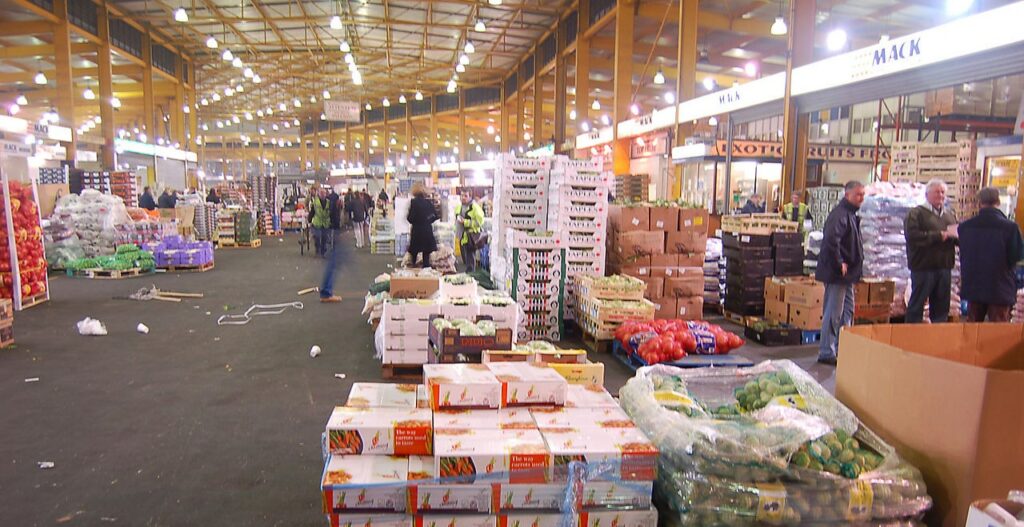
The problem
There is increasing demand on the Community Food Sector (CFS) as more people face food insecurity. At the same time as trying to meet this demand with an increased food offer, the CFS has reported increasing competition for surplus food (sometimes referred to as edible food waste) which makes up part of their diet alongside public donations and purchased food.
Currently, the quality of food from CFS is partly limited by access to fresh produce. The dominant model of accessing surplus food in the CFS is a ‘brokerage model’, reliant on activities conducted between the food industry and the CFS, reliant on the existing processes, goals, and values of the food industry. This contrast with a ‘challenger model’, which is less conditional and with more diverse and collective ways of accessing and sharing food.
Critics of a brokerage model suggest that it could embed the demand for surplus in the system, and that there is a power imbalance which leads to poor quality surplus food being ‘offloaded’ onto the CFS. This provides low grade food to those experiencing food insecurity and transfers disposal costs to the CFS. A challenger model may be more sustainable and fairer.
Birmingham Wholesale Market (BWM) is a source of a significant amount of fresh food waste. Wholesaler tenants have to pay £80 per tonne of food waste produced, which is then processed into biofuel.
BWM may present a good venue from which to divert edible surplus fresh fruit and vegetables to the CFS in Birmingham, and where relationships could be developed to support a transition from a brokerage to a challenger model of surplus food redistribution.
The intervention
A surplus food hub located in BWM, managed by a network of community organisations sends surplus fresh fruit and vegetables to the hub. Promotional materials encourage market tenants to send food at earlier stage to avoid food waste costs.
Participating community organisations sort food into edible and inedible food. Inedible food goes to animal feed or composting. Edible food goes directly to network member organisations or to a local surplus food redistributor for redistribution to the CFS. Over time, changes in culture around food waste and strengthened relationships between BWM and the CFS are used to create conditions for collective purchasing (e.g. via access to data of incoming overstocking).
The research
Primary research question
Does a ‘surplus food hub’ coordinated by participating organisations from the community food sector:
- reduce food waste from Birmingham Wholesale Market?
- improve the food offer in the community food sector
- create the conditions for a transition to a challenger model of surplus food redistribution?
Theory of change
Research design
We will conduct:
- quantitative descriptive assessments of food recovery during intervention, potentially supplemented by time series of total waste leaving BWM site.
- pre- and post- intervention qualitative assessments of change in CFS food offer, culture around food waste/perceived value of sorting unit and readiness for transition to a challenger model of food redistribution.
We will also conduct a process evaluation examining what the facilitators and barriers are to running an efficient sorting unit. This will involve:
- Qualitative assessment of barriers and facilitators to participation of tenants and CFS organisations
- quantitative assessment of food waste at sorting unit; monitoring of other actions that could influence levels of surplus
An economic evaluation will could involve cost/benefit analysis of recovered food, or simple assessment of cost savings for BWM and costs for CFS to run the sorting unit.
Modelling will examine the environmental impacts of recovered food, with scope for modelling health outcomes associated with potential increase in supply of fruit and vegetables to the community food sector.
Outputs and impacts
We anticipate academic papers reporting impact and process evaluations, with possible commentary on transition to a challenger model.
We will input to paper on contributions to system change in community food system.
Research Team
- Dr Alexia Sawyer | MRC Epidemiology Unit, University of Cambridge
- Prof Martin White | MRC Epidemiology Unit, University of Cambridge
- Dr Roxanne Armstrong-Moore, MRC Epidemiology Unit, University of Cambridge
- Dr Soujanya Mantravadi | Institute for Manufacturing, University of Cambridge
- Dr Thomas Ball | Department of Zoology, Univerity of Cambridge
- Dr Rachel Loopstra | Public Health, Policy & Systems, University of Liverpool
- Dr Kehinde Adeosun | Institute of Population Health – University of Liverpool
- Dr Owen Nicholas | Statistical Science, University College London
- Leticija Petrovic | The Food Foundation
